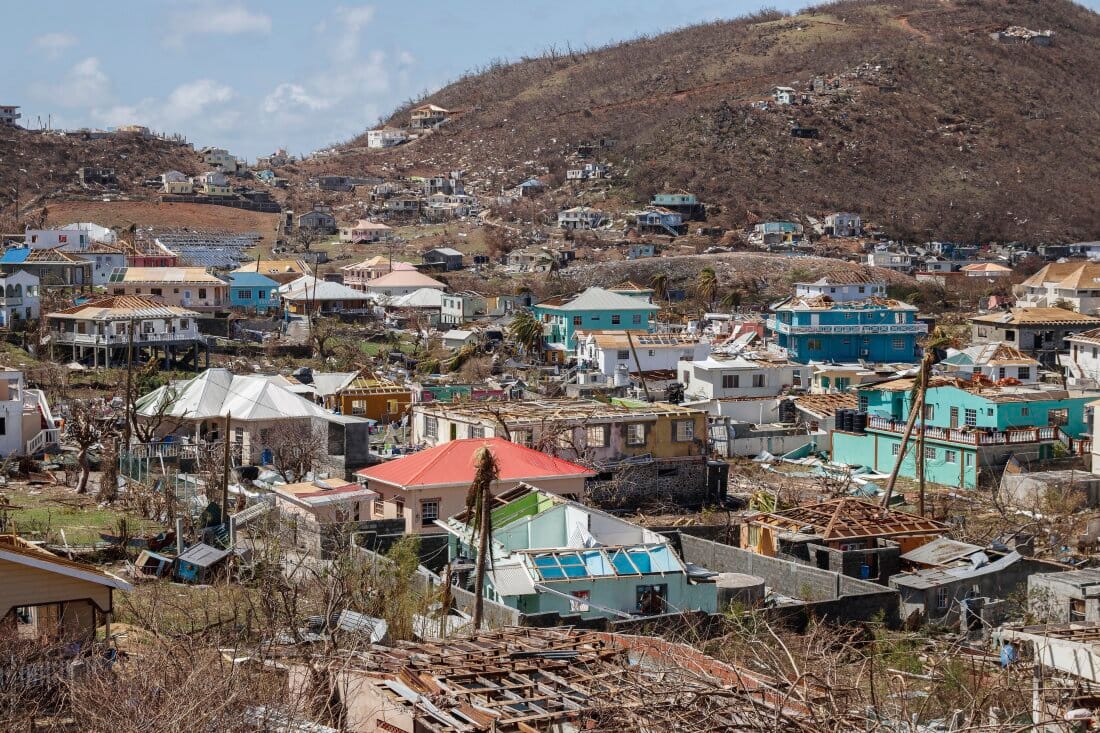
MIAMI HERALD- Insurers in the Caribbean could find themselves facing at least a half-billion dollars in losses from Hurricane Beryl’s powerful winds and rainfall, which left a trail of destruction from Trinidad and Tobago to Texas.
Karen Clark & Company, a catastrophe risk modeling company, estimates that private insurers in the eastern Caribbean and Jamaica are looking at close to a $510 million in losses as countries declare certain parishes disaster zones and hundreds of people remain in shelters and without electricity.
The estimates are the first since Beryl tore through the Caribbean last week, becoming the strongest storm on record in June, before dying after making landfall in Texas as a Category 1. The specialists estimate that Beryl will cost insurers $2.7 billion in the United States and $90 million in Mexico, which was also affected.
Governments in the Caribbean say assessments of Beryl’s damage are ongoing. Still, their initial reports have already indicated that the disaster will be costly.
During a hearing Friday at the Organization of American States, Caribbean diplomats issued an urgent call for help. Small island states, they said, are vulnerable to climate change and they need more access to low-cost financing to help them dig themselves out from the devastation of ripped off rooftops, fallen power lines and downed buildings.
After Antigua and Barbuda asked that a resolution on “Addressing the impact of hurricane Beryl and strengthening climate resilience in the Americas” be adopted by acclamation, Mexico seconded the request and received a round of applause in the chamber.
The resolution’s calls and endorsements are familiar asks that have been raised elsewhere, but yet to be adopted by wealthier nations or financial and development institutions. It includes a request for governments to “take immediate and ambitious actions” to curb hydrocarbon emissions and provide assistance to countries in the region affected by hurricanes and other climate-related disasters. The resolution also endorses calls for financial and development institutions to provide low-cost funding to affected countries.
The resolution also supports a loss and damage fund, previously agreed upon in a United Nations climate conference, to help vulnerable countries rebuild and prepare for storms.

OAS Secretary General Luis Almagro said that the high cost of the damage caused by Beryl is beyond countries’ ability to pay.
“The damage caused by Hurricane Beryl is the latest proof of the staggering dangers brought by these natural disasters that threaten our livelihoods,” Almagro said.
Hurricane Beryl, he said, “is yet another indication that the climate crisis is worsening and will continue to worsen if our countries do not act quickly to implement policies that will mitigate the effects of global warming on our societies.”
Almagro calle for the international community to help small islands deal with such storms and protect their infrastructure.
At least seven people died in the region when Beryl made landfall on the island of Carriacou and battered the Windward islands between mainland Grenada and St. Vincent with 120 mph winds.
Elizabeth Riley, the head of the Caribbean Disaster Emergency Management Agency, who has been touring badly hit areas, told regional journalists this week that the damage assessments “are very much ongoing.” But she confirmed initial reports by the prime ministers of both Grenada and St. Vincent and the Grenadines that the devastation has left few buildings and houses standing on some of their islands. Their damage estimates have ranged from 95% loss of the housing stock on Petite Martinique to 98% in Union Island and Canouan.
“One hundred percent of the persons on Union island and Canouan have been impacted,” Riley said, noting that even if one is among the lucky 2% to have a building that survived the harrowing hurricane, they are still affected by the disaster.
Upon its formation in the Atlantic, Beryl quickly intensified to become a record-setting Category 4 storm. It then made its way through the eastern Caribbean, sinking boats in Barbados, downing trees on St. Vincent and flatting homes as it carved a trail of destruction through the Grenadines. At one point it grew into a Cat 5 hurricane packing 165 mph winds.
Before arriving off the shores of Jamaica, it also pounded parts of Haiti and the neighboring Dominican Republic on the island of Hispaniola. Staying off the Jamaican coast, the storm’s heavy winds and floodwaters slammed the country’s rural southern parishes, leaving thousands without electricity and water.
On Friday, residents in the parish of St. Mary, fed up with the slowness of the Jamaica Public Service in restoring power, took to the streets in protest.
In recent years, Caribbean countries and others prone to climate-related disasters have tried to better protect themselves by signing up for catastrophe bonds.
Unfortunately for Jamaica, a world leader in unique financial structures to help the island respond to hurricane damage, its brand new catastrophe bond won’t be paying out anything for Beryl’s damage.
Despite the fact that the at-one-time Category 5 hurricane was the strongest on record this early in the Caribbean, the $150 million catastrophe bond Jamaica planned to use to help recover can’t be tapped because it only releases the money when certain parameters are met. In this case, the money was set to be released if the air pressure inside the hurricane dropped below a certain level.
Switzerland-based Plenum Investments told bond investors that “based on the central pressure data published by the National Hurricane Center, the air pressure required for a payout of the cat bond wasn’t reached,” Bloomberg reported.
Jamaica renewed this particular bond in April, four years after it took it out for the first time. It’s one piece of a $1.6 billion disaster safety net.
Grenada, which was perhaps the hardest hit Caribbean nation, said it plans to ask creditors for a special deal to delay payments on its debts due to the hurricane, a clause it added in 2004 after Hurricane Ivan shattered the island.
Prime Minister Dickon Mitchell has not formally asked to trigger the debt provision but Grenada likely will soon, Now Grenada reported.
©2024 Miami Herald. Visit miamiherald.com. Distributed by Tribune Content Agency, LLC.
Advertise with the mоѕt vіѕіtеd nеwѕ ѕіtе іn Antigua!
We offer fully customizable and flexible digital marketing packages.
Contact us at [email protected]
















